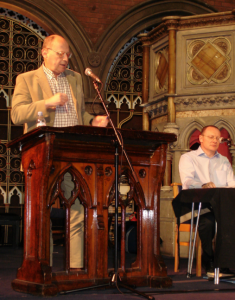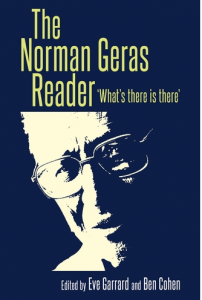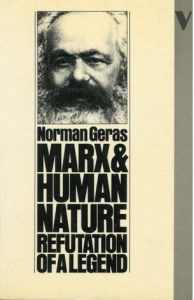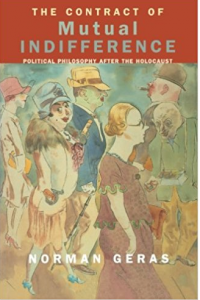
I made these remarks at the launch party for The Norman Geras Reader in London on 2 October 2017. The book includes my short essay, ‘On Geras’s Marxism’ – you can download it and the editorial introduction by Eve Garrard and Ben Cohen for free at iBooks (but please buy the book!). Some background: I was a student of Norman’s from 1980-1983 when we were both Trotskyists. He was a member of the International Marxist Group and I was a member of Socialist Organiser. In 2006 we joined with others to co-write the Euston Manifesto – although I opposed the Iraq war and led South Lakeland Stop the War while Norman supported the war, a disagreement amongst the signatories not discussed here and a disagreement that was deliberately ignored at the time when we were falsely portrayed as the ‘pro-war left’. I am working on a study of Norman Geras’s socialism.
*
Bravo for the book, Ben and Eve! I was in Waterstones in Gower Street recently and found three of Norman’s books on the shelves – The Legacy of Rosa Luxemburg, Marx and Human Nature and The Literature of Revolution: Essays on Marxism (all half price in the Verso Flash Sale until December 31). With the appearance of The Norman Geras Reader perhaps we can hope for a renaissance of interest in his work.
Ben asked me to say a few words about Norman and his ideas. I’ll make three points. Two points about Norman as a teacher and intellectual. One about why he is one of the socialist theorists we will need most in the twenty first century. And that’s what he was: a socialist theorist.
1. A real teacher
I was taught by Norman in the early 1980s at Manchester University. Norman was a real teacher, which is a rare thing. I recall he introduced us to Marx’s theory of value, and the difference between use value and exchange value by reference to his socks. He would begin by saying ‘they keep my feet warm’. They had a use value or, as the subtitle of the Reader puts it, ‘what’s there is there’. But Norman knew that what’s there on the surface is never everything that’s ‘there’. So he would also tell us that his socks cost him £1.99, and lead us into the mysteries of the commodity.
Talented in the classroom, I think he was almost unsurpassed as a teacher on the page. You can get a real education by reading his essays. If you are willing to sit there, read and read again, pencil in hand, and to think hard and discuss critically what you find there, you will get a better education than you will from many university courses. I am sure I learned to think by reading The Legacy of Rosa Luxemburg.
I learnt what an argument was by reading it, and talking to Norman about it. I wrote something about this experience in my short essay ‘On Geras’s Marxism’ that is included in the Reader: ‘It is the joy one feels when the clouds part, the sun shines, and the meaning and importance of theory becomes not just clear but part of one’s own flourishing. For those who have not read Geras-as-Marxist, that joy awaits.’
2. A model of intellectual seriousness
That brings me to the second thing I want to say. For me, he was a model of intellectual seriousness. I don’t mean he was po-faced. No one reading Normblog could think that. From Jazz to Jane, Old Trafford to Lords, Norm was, so to speak, up for it. I mean rather that his work was marked by meticulous exegesis, scrupulous critique and the creative development of whatever he was dealing with, including his own tradition, Marxism. He made you feel something of the seriousness of ideas. And Norman was also a real reader. Philip Roth once said that about Irving Howe: ‘Irving’s a real reader’. Well, Norman Geras read the ideas of others as well as anyone – Marx, Lenin, Trotsky, Luxemburg, Althusser, Rorty, Laclau and Mouffe. What Norman wrote about the travesties of Marxism that he saw proliferating might be a description of much of our intellectual culture today. He complained of ‘the quick casual disparagement, untroubled by the effort of serious proof or even advocacy’. That is often the ground tone these days. (See his essays for New Left Review here.)
3. A socialist theorist we need
The third and last thing I want to say is this. Norman is one of the socialist theorists we need most in the twenty first century. (So those of you who are now anti-socialists can play with your phones for a few minutes.) First, because of his theory of socialist agency; second, because of his theory of socialist ethics and third, because of his still-developing theory of the future socialist polity and society, summed up in his essay published in The Socialist Register, ‘Minimum Utopia: Ten Theses’, in my opinion one of the most compelling sketches of what we are fighting for.
Agency
His contribution to a theory of socialist agency is under appreciated. From the foundation stone laid in 1973 in his short essay ‘Marxism and Proletarian Self-Emancipation, in which he insisted that ‘the principle of self-emancipation is central not incidental to historical materialism’ to his 1994 New Left Review essay, ‘Democracy and the Ends of Marxism’, in which he usefully suggested we extend the constituency of socialism to what he called ‘the dispossessed and the impoverished, everyone struggling under the burden of some grave want’, he was always thinking about why socialists have been attracted to, and how socialists can avoid in future what Marx and Engels called ‘the old crap’. They meant that idea of socialism as the ‘enlightened’, ‘progressive’, and authoritarian imposition of a blueprint from above. This is Žižek’s ‘lost cause’. Norman refused to defend it, and few were as eloquent about why. The old crap is having a new lease of life today. Some of the ‘new communists’ seem to have learned little from the enormities of the twentieth century.
Ethics
Second, there is Norman’s theory of socialist ethics. He stood for a moral realism, a notion set out in Marx and Human Nature and developed in many subsequent essays. This notion is more commonplace on the left today than it used to be, thanks in good part to him. What is this notion? That a proper conception of our transhistorical human nature, of our human needs and capacities, of the objective conditions of our flourishing, can serve us, and if wish to avoid the crimes committed by the left in the twentieth century should serve us as ‘an evaluative standard of normative judgment’. I think his attempted reconciliation of socialism as an ethic and as a science, of fact and value, of ‘is’ and ‘ought’, was a vitally important contribution that socialists should develop in both our critique of capitalism and our conception of socialism.
Minimum Utopia
Thirdly, he did much to make good a real deficit in socialist thinking by giving us a huge amount of real value with which to construct a socialist political theory. We can learn a lot from him about socialist political institutions, socialist values, and the socialist society.
In the end the name of his desire was ‘minimum utopia’. (Some of us recently discussed setting up a new journal called Minimum Utopia. Who knows. Maybe.) Minimum utopia is post-Gulag socialism and post-Holocaust socialism. Socialism, as he put it, in the shadow of catastrophe. A minimum utopia would be ‘a world cured of its most remediable deprivations and horrors’, a world that provides for its members ‘the material and social bases for a tolerably contented existence’ and from which ‘the gravest social and political evils familiar to us have been removed.’
Doesn’t sound like much? Well, Geras disagreed. He thought it would be an immense good in itself. Yes, he thought it was a utopia that was sensible of our intrinsically mixed human natures. As Primo Levi put it, we are centaurs; the malign sits alongside the benign, and we need, in those shadows, to bear that in mind as we imagine the futures we are capable of. But crucially he also pointed out that this minimum utopia – and I’ll be a little provocative at this point and add ‘”Gerasites” take note!’ – would amount to ‘so fundamental a transformation of economic wealth and power, and of the distributive norms relating to need, effort and reward that it is revolutionary in its scope’. So, yes, Norman did tell us socialists to begin negotiating articles of conciliation with egalitarian liberalism. But if I can be allowed another provocation, he never told us to negotiate articles of surrender with capitalism or the culture of liberal individualism which, he told us, underwrites ‘the contract of mutual indifference’.
He thought that we socialists still had an awful lot to teach liberals. He was right to do so.
For all those reasons, and more I don’t have time to discuss tonight, I think the legacy of Norman Geras will turn out to be of great importance for socialists in the future.







